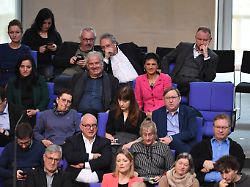Get group status
What BSW and the Left are now allowed to do in the Bundestag
February 2, 2024, 2:58 p.m
Listen to article
This audio version was artificially generated. More info | Send feedback
With the departure of Sahra Wagenknecht and her colleagues from the Left Party, the Left Party loses its faction status. Now both sides have group status and therefore more rights than in previous weeks. Nevertheless, they feel they are being “unnecessarily harassed” and are considering taking the matter to court.
The Bundestag has recognized the members of the Left Party and the Alliance Sahra Wagenknecht (BSW) as parliamentary groups. The traffic light factions and the affected previously non-attached MPs from the Left and BSW voted in favor of a corresponding proposal from the government coalition. The 28 parliamentarians from the Left Party and the ten BSW MPs will now have more parliamentary rights than non-attached MPs, but fewer than the five parliamentary groups.
Both groups are made up of MPs from the former Left Party, which dissolved in December 2023 after Sahra Wagenknecht and her colleagues split from the Left Party. MPs from both parties had sought group status. The exact structure of the rights is not set out in law, but was negotiated in advance by the parliamentary groups and the two future groups.
The SPD MP Katja Mast spoke of a “sensible middle ground”. She highlighted the rights of initiative which, according to the Bundestag’s rules of procedure, are only given to parliamentary groups and which are now also granted to the two new groups. In addition, the groups will now be able to submit ten small or large requests to the federal government per month. “This protects the parliamentary control rights of the MPs,” emphasized Mast.
Control rights “massively restricted”
The left-wing MP Heidi Reichinnek criticized the limitation of requests. “The central task of the opposition is to control the government and ensure transparency,” said Reichinnek. The most important means of doing this are small requests. This would “uncover scandals” and “inquire about information that would otherwise not be made public.” Limiting this to ten per month would be “ridiculous,” emphasized Reichinnek. “If this restriction remains in place, we will consider going to court,” said Reichinnek.
The BSW also reserved the right to have the limitation legally reviewed. Jessica Tatti from BSW spoke of “unnecessary bullying”. “The government apparently decides for itself to what extent it wants to be controlled by the opposition.” The fact that “the ‘traffic light’ is using the dissolution of the left-wing faction to massively restrict the opposition’s right to ask questions and control” is “a real absurdity.”
On the other hand, criticism of too many parliamentary rights came from the Union. Thorsten Frei warned against “paving the way into parliament” for the “increasing fragmentation in the party landscape”. The Union is of the opinion that rights must be “limited to what is constitutionally required”.
Equal rights in committees
In the future, the groups will be able to submit draft laws, motions and motions for resolutions in addition to the questions. They can request that their proposals be placed on the agenda and, if necessary, interim reports on their proposals be submitted. The speaking time of the groups should be based on their respective strength in relation to the factions. The group chairmen should have the same rights as group chairmen. The groups should receive cash and benefits in kind from the federal budget.
Both groups should be able to send members to the specialist committees and, if necessary, to their subcommittees and have the same rights there as the members sent by the parliamentary groups. Both groups should also be able to be represented by one member each in the Council of Elders and have the right to vote in decisions on internal affairs of the Bundestag.
After Wagenknecht and her colleagues left in December 2023, the left-wing faction fell below the minimum group size of 37 members and dissolved. Since then, the parliamentarians have been non-attached members of the German Bundestag. The BSW was founded in January.
The fact that MPs already represented in the Bundestag are forming new groups is a novelty. So far, a group has been recognized as such four times – the left-wing predecessor party PDS three times, and the Greens between 1990 and 1994.
